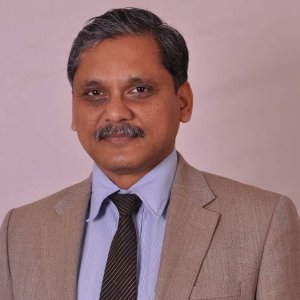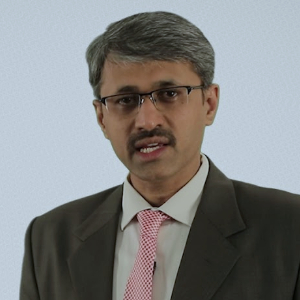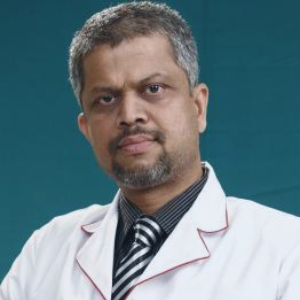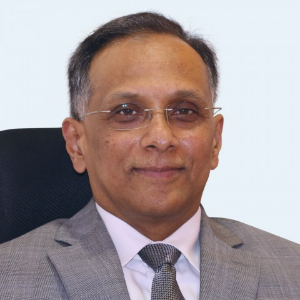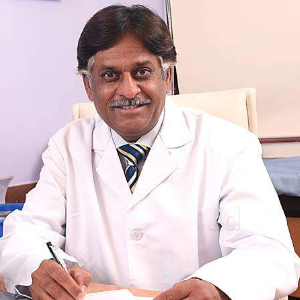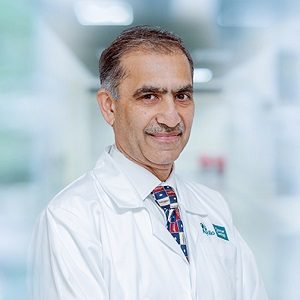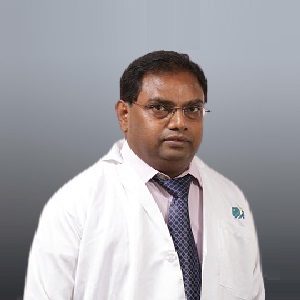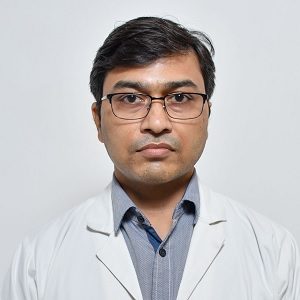Best Stereotactic Radiosurgery Doctors in india
- Neurosurgeon & Spine Surgeon, Bengaluru, India
- Over 20 years’ experience
- Fortis Hospital Banerghatta Bengaluru
Profile Highlights:
- Dr. Prahraj S S is a leading Neurosurgeon who specializes in all types of neurological surgeries and has performed over 6000 neurosurgeries till date along with complex cranial and spine surgeries.
- He is one of the most renowned neurosurgeons in the country and has provided his services to some of the premier medical institutes in India such as NIMHANS where he performed a large number of spinal surgeries.
- Neurosurgeon & Spine Surgeon, Bengaluru, India
- Over 15 years’ experience
- Gleneagles Global Hospital Bengaluru
Profile Highlights:
- Dr. Praveen K S is a highly qualified neurosurgeon with over a decade of experience in handling all kinds of neurological diseases and disorders.
- He specializes in Pediatric Neurosurgery, Neuro-Oncology, Endoscopic neurosurgery, Aneurysms, and Neuro- Trauma and has performed over 4000 neurosurgeries in his career.
- Neurosurgeon & Spine Surgeon, Mumbai, India
- Over 20 years’ experience
- Wockhardt Hospital Mumbai
Profile Highlights:
- Dr. Rahul Modgi is a highly established neuro and spine surgeon in Mumbai specializing in all types of brain and spine surgeries.
- Dr. Rahul Modgi’s name has been recorded in the Limca Book of Records in 2014 when he removed the heaviest iron rod from the brain of a 17-year-old patient. He has also performed various other risky surgeries for which he has greatly appreciated.
- Neurosurgeon, Bengaluru, India
- Over 30 years’ experience
- Fortis Hospital Banerghatta Bengaluru
Profile Highlights:
- Dr. Rajakumar V Deshpande is a renowned Neurosurgeon in Bengaluru. He performed the first pedicle screw fixation surgery for a spine injury in Bangalore.
- Dr. D V Rajakumar specializes in endoscopic neurosurgeries and has performed some of the most complex brain and spine surgeries through the endoscopic approach. His other areas of interest include minimally invasive neuro surgeries, management of cerebrovascular diseases, and brain tumor surgeries.
- Neurosurgeon, Mumbai, India
- Over 20 years’ experience
- Gleneagles Global Hospital Parel Mumbai
Profile Highlights:
- Dr. Suresh Sankhla is an accomplished Neurosurgeon in Mumbai specializing in endoscopic neurosurgery and onco-neurosurgery.
- Dr. Sankhla acquired his training in neurosurgery under the guidance of the best trainers from well-known medical institutes and hospitals in Ireland, UK, USA as well as India.
- He has an equal interest in research and has published more than 100 articles, papers, and abstracts in renowned national and international peer-reviewed journals.
- Radiation Oncologist, Chennai, India
- Over 30 years’ experience
- Apollo Cancer Centre Chennai
Profile Highlights:
- Dr. Sanjay Chandrasekar is one of the top Radiation Oncologists in Chennai who has an extensive experience of more than 30 years in the field.
- He is currently serving as a Senior Consultant of Radiation Oncology at Apollo Cancer Centre in Chennai.
- His 30+ years-long journey in the field of oncology has brought him a lot of appreciation and recognition in his medical career.
- He has a great deal of expertise treating a range of cancer ailments such as brain tumors—both benign and malignant, head and neck cancers, lung cancer, and uro-gynecological cancers.
- Over the years he has also published numerous papers in peer-reviewed journals on both national and international level. In addition, he has received several honors and commendations for his efforts.
- Radiation Oncologist, Chennai, India
- Over 32 years’ experience
- Apollo Cancer Centre, Apollo Hospitals Greams Road
Profile Highlights:
- Dr. Rajendran B has developed expertise in the treatment of conditions like Cancer and Central Nervous System Tumors.
- He has studied radiotherapy and was recognized as the first oncologist to perform radiosurgery in Northern Malaysia in 2008.
- Dr. Rajendran takes interest in engaging in social groups related to his field and holds Indian Medical Association (IMA) membership.
- Neurosurgeon, Gurugram, India
- Over 25 years’ experience
- Artemis Hospital, Gurgaon
Profile Highlights:
- Dr. Pawan Goyal is a renowned neurosurgeon in Gurugram with 25 years of experience.
- He gained expertise in endoscopic neurosurgery, minimally invasive spine and neurosurgery, all brain and spine tumors, head and spine injuries.
Best Stereotactic Radiosurgery Hospitals in India
- City: Mumbai, India
Hospital Highlights:
- Fortis Hiranandani hospital was established in 2007.
- The hospital is an advanced tertiary care, multi-specialty hospital equipped with 149 beds.
- The hospital is equipped with a super ICU to provide emergency medical care to critically ill patients.
- The hospital is NABH accredited.
- The critical care facility in the hospital is augmented with the state-of-the-art facilities that facilitate speedier diagnosis and efficient monitoring.
- The hospital provides specialty medical services in cardiology, orthopedic science, pediatric science, neurology, diabetic care, urology, nephrology, ENT, obstetrics, gynecology, cosmetic surgery, bariatric surgery, neuro and spine care.
- City: Gurugram, India
Hospital Highlights:
- W Pratiksha Hospital, Gurugram, is one of the best hospitals in the NCR region. It is also a top hospital in India for IVF. Since its inception, the hospital has performed over 5500 successful IVFs. The hospital also specializes in gynecology.
- With over 20 years of experience in providing quality healthcare, the hospital is known as one of the most trusted and valued health providers in India.
- Equipped with world-class medical facilities and advanced technology, the hospital’s doctors and clinicians also have a track record of delivering excellent results. The hospital is also known for focusing on preventive well-being as much as on curative treatment.
- The hospital has earned the trust of its patients, by providing the best available treatments at affordable costs.
- City: Gurugram, India
Hospital Highlights:
- Paras hospital was established in 2006 and is the 250 bedded flagship hospital of Paras Healthcare.
- The is supported by a team of doctors of international and national repute.
- The hospital is NABH accredited and also the first hospital in the region to have a NABL accredited laboratory.
- The hospital provides specialty medical services in around 55 departments including Neurosciences, Joint Replacement, Mother & Child Care, Minimal Invasive Surgery, Gynecology and Obstetrics, Ophthalmology, Dermatology, Endocrinology, Rheumatology, Cosmetic and Plastic surgery.
- The hospital is equipped with state-of-the-art technologies.
- City: Kolkata, India
Hospital Highlights:
- Fortis Hospital, Anandapur, Kolkata is a world-class super-speciality equipped with the latest technologies in the medical world.
- The hospital is NABH accredited.
- This state-of-the-art facility specializes in cardiology and cardiac surgery, urology, nephrology, neurosciences, orthopaedics, digestive care, emergency care and critical care.
- The hospital, governed by integrated Building Management System (IBMS), has a pneumatic chute system, for quick vertical and horizontal transportation between floors, facilitating speedy transfer of patient specimens, documents, reports, and medicines to the concerned departments.
- The hospital also has a nephrology department with over 28 advanced dialysis units.
- City: Mumbai, India
Hospital Highlights:
- SL Raheja hospital is a 140-bed multi-specialty tertiary care hospital that is being managed by Fortis Healthcare Ltd.
- The hospital is a benchmark in healthcare and medical facilities in the neighborhood of Mahim & the western suburbs.
- L.Raheja Hospital, Mahim has one of the most effective ICU and Casualty care services.
- The hospital provides specialty medical services in Cardiology, Oncology, Neurology, Orthopedics, Mother & Child Care, and in Diabetes.
- City: Mumbai, India
Hospital Highlights:
- Wockhardt Hospitals were established in the year 1973, originally called First Hospitals and Heart Institute.
- Wockhardt Hospitals are super specialty health care networks in India, nurtured by Wockhardt Ltd, India’s 5th largest Pharmaceutical and Healthcare company.
- Wockhardt Hospitals is associated with Partners Harvard Medical International, an international arm of Harvard Medical School, USA.
- Wockhardt Heart Hospital performed India’s first endoscopic heart surgery.
- The hospital has a state-of-the-art infrastructure equipped with the latest technologies and modern equipment.
- It has special Centers of Excellence dedicated to the major specialties to provide hassle-free and high-quality clinical care.
- City: Gurugram, India
Hospital Highlights:
- The CK Birla Hospital in Gurugram is a NABH-accredited multi-specialty hospital.
- The hospital strives to increase the quality of healthcare by focusing on UK NHS nurse and midwife training requirements. Policies and practices derived from the National Institute for Health and Treatment Excellence (NICE) recommendations in the United Kingdom ensuring that a strong focus on safety, high-quality clinical care, and sanitation is maintained.
- The hospital’s cutting-edge technology and facilities allow for real-time communication and seamless collaboration among caregivers, ensuring accuracy and the best possible results. Those with foreign experience and accreditations make up part of the hospital’s team of clinicians.
- City: Ahmedabad
Hospital Highlights:
- As a member of the Apollo Hospitals Group, Apollo Hospitals International Limited, Ahmedabad is one of the most popular and sought-after medical facilities in Gujarat.
- Through its 6 Centres of Excellence and various affiliated branches, which cover all specialties and subspecialties, the hospital provides the most advanced clinical services.
- Since its inception in 2003, the hospital has been providing each patient with the most up-to-date medical equipment and state-of-the-art technology.
- With more than 150 successful organ transplants, including liver and renal transplants, the facility has been able to build a strong and extensive organ transplant program.
- In addition to performing 600 surgeries and caring for over 1800 patients on an IP basis, the hospital sees more than 18,000 patients on average in the outpatient department.
- With one of the biggest cardiology teams in the area, the hospital provides state-of-the-art regional care treatment in Cardiac Sciences.
- Additionally, the hospital offers a broad range of Neuro Interventional techniques to help stroke patients recover more quickly.
- City: Noida, India
Hospital Highlights:
- Jaypee Hospital is the flagship hospital of the Jaypee Group.
- This hospital has commissioned 525 beds in the first phase and has been planned and designed as a 1200 bedded multi-specialty facility.
- It holds the accreditation of the NABH and NABL.
- The hospital has state-of-the-art infrastructure equipped with the latest technologies and modern equipment like 64 Slice PET CT, Dual Head 6 Slice SPECT CT, Gamma Camera, and Da Vinci Robotic Surgery for comprehensive robotic surgical solutions.
- It has special Centers dedicated to the major specialties to provide hassle-free and high-quality clinical care.
- City: Mumbai, India
Hospital Highlights:
- Reliance Hospital is one of the best super-specialty care hospitals in Navi Mumbai.
- The main purpose of this hospital is to become a trustworthy place for the best health and hope for society. The hospital is well connected to the suburbs of Mumbai and Navi Mumbai.
- The hospital has various specialty departments, viz., Accident & Emergency, Anesthesiology, Dental Services, Dermatology, Diabetology, Dietetics Nutrition, Endocrinology, ENT, Gastroenterology, General Surgery, Gynaecology And Obstetrics, Hepato Pancreato Biliary Surgery, Infectious Disease, Internal Medicine, Interventional Radiology, Laboratory Medicine, Minimal Access Laparoscopic Surgery, Nephrology, Neurosciences, Opthalmology, Orthopaedics, Paediatrics, Pain Management Palliative Care, Physical Medicine Rehabilitation, Plastic And Reconstructive Surgery, Psychiatry, Pulmonary Medicine, Radiology, Rheumatology, Transplant, Urology Andrology, Vascular Surgery
Stereotactic Radiosurgery
When doctors are unable to treat a disease with surgery due to the location of the problem or the health of the person who needs the treatment, then they might consider stereotactic radiosurgery (SRS) to address some of these problems.
Stereotactic radiosurgery is a form of radiation treatment that makes the use of focused delivery of radiation in high doses to precise locations in your body. It can be used to treat certain kinds of tumors and other abnormalities in the spine, brain, neck, lungs, or liver.
The technique was developed in the 1950s by Swedish neurosurgeons to treat small tumors located deep in the brain without causing damage to the nearby healthy tissues. Doctors now use this technique to treat any part of the body where tumors are hard to reach or are close to any vital organs.
Purpose
Though stereotactic radiosurgery was initially developed to treat small, deep brain tumors, now it is used for a wider array of problems in the brain as well as other parts of the body. Doctors now use this method for treating areas in the brain or anywhere else that are hard to reach or close to vital organs or they also use it to treat tumors that have moved within the body. Various problems can be addressed with Stereotactic radiosurgery, some of them including:
- Deep brain tumors
- Pituitary tumors
- Cancers of the eye
- Residual tumor cells after surgery
- Neurological problems, such as trigeminal neuralgia
- Arteriovenous malformations, which are tangled blood vessels leaking and disrupting your normal flow
- Parkinson’s disease
- Epilepsy
- Tumors in the liver, lung, spine, prostate, abdomen, head, and neck
Generally, doctors prefer stereotactic for treating older adults or people who are too sick to undergo conventional surgery. Sometimes, after some undergo surgery for removing a cancerous tumor, a doctor can use stereotactic radiosurgery to kill any remaining tumor cells that the surgeon might have missed.
Preparation
You will generally have one or more imaging scans, such as a CT scan or an MRI, before your treatment. Your doctor might inject a contrast agent as it can help them understand the size and location of the tumor or any other structure that they will need to treat. A lot of planning will go into structuring your treatment as well.
Let your doctor know about any medications you are taking or any implants or devices that you have such as:
- A pacemaker
- An artificial heart valve
- Stents
- Implanted pumps
Remember not to eat after midnight on the day of the procedure. Also make sure that you remove items such as eyeglasses, contact lenses, or dentures before the treatment.
Procedure
The procedure can be of various types depending on your condition.
Gamma knife radiosurgery involves aiming nearly 200 beams of highly focused gamma radiation at the target region, such as a tumor. This is used for small- to medium-sized brain or head and neck abnormalities as well as functional brain disorders such as essential tremor.
Linear accelerator machines can involve the use of high energy X-rays to target large tumors by delivering radiation over several treatments. This is sometimes termed as CyberKnife technology.
Proton beam or heavy-charged-particle radiosurgery is used by the doctor for treating smaller tumors throughout the body.
All these methods require a lot of imaging with CT scan, MRI, or maybe other methods, so that your doctor will know where exactly the tumor is, as well as its size.
The professionals in your surgery team can include:
- a radiation oncologist
- a dosimetrist
- a radiologist
- a medical radiation physicist
- a radiation therapist
- a radiation therapy nurse
It is important for you to stay completely still for these methods to work. This will help to ensure that your doctor is able to target the radiation to the affected tissues and that the treatment doesn’t affect as much of your normal tissue. Your doctor might also place strips on you so that you are immobile, or they might place a special facemask or a frame that attaches to your scalp to keep you from moving during the treatment.
You will lie down on a table which will be sliding into a machine. This machine might spin around you to change the angles of the radiation beams. Throughout the procedure, your healthcare team will be able to watch you on a camera. You will be able to speak to them through a microphone if you experience any problems.
Generally, the treatment takes around 30 minutes to one hour. Though your problems should be addressed in a single session, in a few cases, additional treatments can be required.
After the procedure
You should be able to eat and drink after the procedure is complete. You might experience minor bleeding or tenderness at the pin sites. If you experience any headache, nausea, or vomiting after the procedures, you will receive appropriate medications.
It generally takes weeks or sometimes even months for the targeted cells to stop reproducing and die off. Your doctor will continue to check the size of the tumor and the treated area using CT scans and MRI.
Risks
Since stereotactic radiosurgery doesn’t involve surgical incisions, it is generally less risky as compared to traditional surgery.
Some of the early complications or side effects that might occur after the surgery include fatigue, swelling in scalp and hair problems.
In some cases, people might also experience late side effects, such as any kind of neurological problem. This can happen several months after the treatment.

